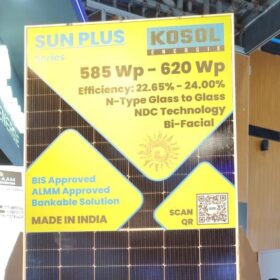India added 3,239 MW of solar capacity last year for a 56% decline from the 7,346 MW installed in 2019, according to Mercom India’s 2020 Q4 and Annual India Solar Market Update.
The analyst’s report added, the 2,520 MW of large scale solar projects added last year accounted for 78% of installations. Some 719 MW of solar rooftop generation capacity made up the balance.
Andhra Pradesh, Rajasthan, and Gujarat led the large scale additions, contributing around 51% of installations.
“India’s solar installations in 2020 were the lowest in five years,” said Mercom Capital CEO Raj Prabhu. “While other top solar markets in the world have experienced positive growth, India, which had one of the most stringent lockdowns in response to the pandemic, took a while to get back up and running. However, we expect the industry to experience significant positive growth in 2021.”
Recovery
Solar installations picked up in the second half of 2020 as economic activity resumed after the Covid-19 lockdown. Photovoltaic project additions in the fourth quarter stood at 1,505 MW, a 244% rise on the 438 MW seen in the July-to-September period.
Mercom India expects the nation to add more than 10 GW of solar this year.
“The solar industry has shown incredible resiliency amid all the chaos brought on by the pandemic,” said Prabhu. “The market is on the verge of experiencing two of its best years-to-date, in 2021 and 2022, unless further disruptions, in the form of ill-conceived policies, hurt growth.”
According to the report, India has a robust large scale solar project development pipeline of 47.5 GW, with another 24.5 GW of projects tendered and pending auction at the end of last year.
This content is protected by copyright and may not be reused. If you want to cooperate with us and would like to reuse some of our content, please contact: editors@pv-magazine.com.









2 comments
By submitting this form you agree to pv magazine using your data for the purposes of publishing your comment.
Your personal data will only be disclosed or otherwise transmitted to third parties for the purposes of spam filtering or if this is necessary for technical maintenance of the website. Any other transfer to third parties will not take place unless this is justified on the basis of applicable data protection regulations or if pv magazine is legally obliged to do so.
You may revoke this consent at any time with effect for the future, in which case your personal data will be deleted immediately. Otherwise, your data will be deleted if pv magazine has processed your request or the purpose of data storage is fulfilled.
Further information on data privacy can be found in our Data Protection Policy.